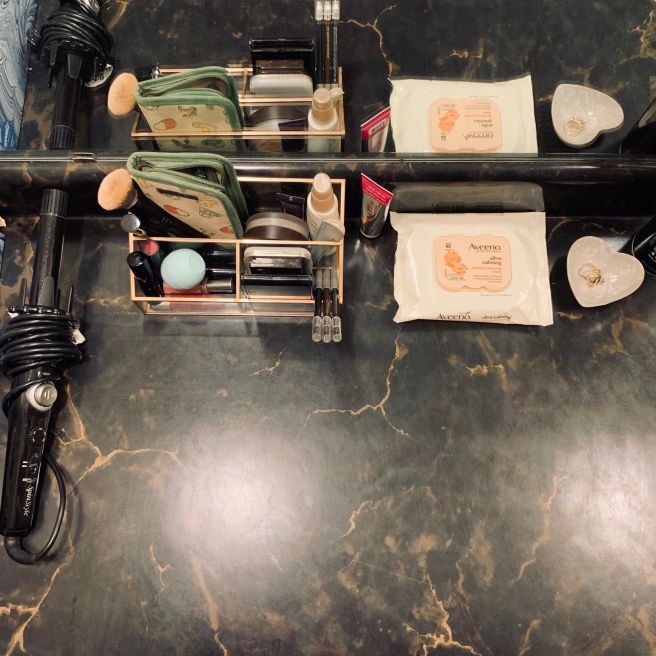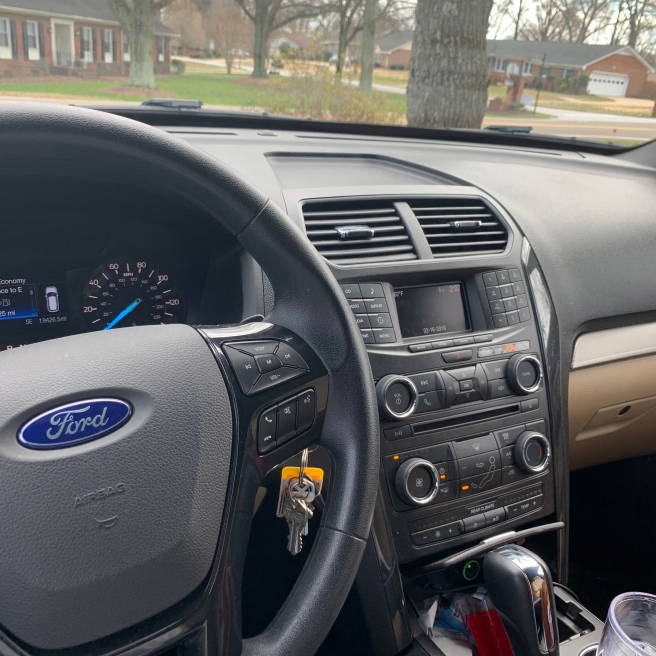
I’ve loved this part of our house from the second I saw it. I gushed about it for entirely too long after our realtor first showed us the house. On the far end of our bedroom, right outside the master bath, we have this vanity. Giant mirror, extra sink, and two glorious antique pendant light fixtures. I’ve never been a huge beauty enthusiast, but the idea of having a special little space to fix my hair and put on make-up was a super fun bonus selling point for the house. Not to mention that our bathroom counter is itty-bitty and my husband very much appreciates that I don’t have to hog the space while he’s just trying to brush his teeth, for goodness’ sakes.
I might not spend a lot of time here, but this is a place where I spend at least a few minutes every single morning. My make-up routine is simple, but I rarely leave the house without it. “Fixing my hair” is usually just brushing it and loading it up with an unnecessary amount of hairspray (sorry atmosphere), although lately I’ve been curling it a lot more because the SpinStyle Pro is literally the fairy godmother’s magic wand and only takes five minutes to complete.
I have a confession to make: more often than not, I’ll put up a front of apathy towards something I know I care about more than I should. Example A: my looks. I will not be reduced to a pretty face! I’m not that shallow! I am a strong woman who will be valued for my character! …But if I could get just a little mascara on the side with that, that would be great.
I’m making a conscious effort to recognize just how much I dwell on my external appearance. It’s a lot, by the way. I find myself wondering why I still, in my mid-twenties, have the acne of a pubescent student. Or I find myself critiquing my midsection for being far from ideal. Or I find myself questioning why God gave me straight, limp hair instead of a young-Julia-Roberts-curl-mane (because it’s the epitome of human beauty, obviously).
As much we might like to think that we’re beyond such an antiquated mindset of obsessing over outward beauty, I don’t think it’s ever going away. We’re independent, modern women, after all, but our culture is incredibly hypocritical. We champion the inner beauties and call out the body-shammers, while simultaneously cultivating billion-dollar beauty product, fashion, and weight loss industries. Maybe King Lemuel’s mom really was offering wisdom for the ages when she said “Charm is deceptive, and beauty is vain, but a woman who fears the LORD is to be praised” (Proverbs 31:30).
As a teenager, I had this verse stenciled on my bathroom wall. And if you grew up in the church and are without a Y chromosome, then I’d be willing to bet you’re already pretty familiar with it too. As with the book of Ecclesiastes, “vain” here is less about excessive pride, as it’s often used in modern contexts, and more about futility. The NIV translates the word as “fleeting” and the Message renders the phrase “beauty soon fades.” The idea is that outward appearance is essentially useless, because eventually, it’s going away.
I was reading this post on Facebook the other day (which is an embarrassing way to preface any example ever) written by a girl talking about why she never wanted to be a mom. It wasn’t that she didn’t feel called to that role. It wasn’t that she was overwhelmed by the responsibility of it all. The sole reason she cited for never wanting children is because of the changes the process might have on her physical appearance. The thought of stretch marks or possibly a C-section scar was just too much to bear. To be frank, it disgusted me. I wanted to grab this girl by the shoulders and scream “Don’t you know? Don’t you know you’re going to get old one day? Don’t you know that your perfect appearance is eventually going to run its course? Gravity wins, honey!”
Oh, how two-faced I can be. So many days, I tell myself the same lie: achieving and maintaining my idea of a “perfect appearance” is what will ultimately bring me joy. If my skin would just get a little clearer, if my waste could be just a little tighter, if my hair would have just a little more volume, life would somehow be better for me. Don’t I know? Don’t I know that it’s all temporary? Don’t I know that beauty fades, but fear of YHWH remains?
So sisters, it’s time to come out of the shadows. Let’s stop pretending that we’re all way past serving the idol of physical beauty. I’m tired of the apathy act. Let’s allow the vanities where we beautify ourselves to testify to the true nature of our outward appearance, which of course, is vanity. Let’s confess the ways in which we obsess over that which is fleeting, and let’s push one another on towards fear of God and love of neighbor. These will never fade.

